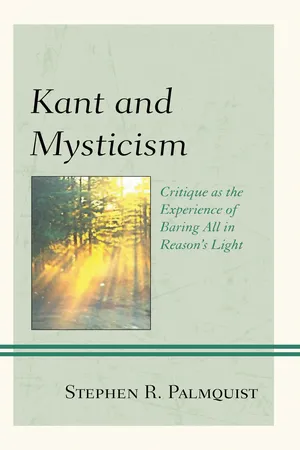
eBook - PDF
Kant and Mysticism
Critique as the Experience of Baring All in Reason's Light
- 183 pages
- English
- PDF
- Available on iOS & Android
eBook - PDF
About this book
What is happening when someone has a mystical experience, such as "feeling at one with the universe" or "hearing God's voice?" Does philosophy provide tools for assessing such claims? Which claims can be dismissed as delusions and which ones convey genuine truths that might be universally meaningful? Valuable insights into such pressing questions can be found in the writings of Immanuel Kant, though few philosophical commentators have appreciated the implications beyond his famous "Copernican hypothesis." In Kant and Mysticism, Stephen R. Palmquist corrects this skewed view of Kant once and for all.
Beginning with a detailed analysis of Kant's 1766 work Dreams of a Spirit-Seer, Palmquist demonstrates that in Dreams Kant first discovers and explains his plan to write a new, "critical" philosophy that will revolutionize metaphysics by laying bare the limits of human reason. Palmquist shows how the same metaphorical relationship—between reason's dreams (metaphysics) and sensibility's dreams (mysticism)—permeates Kant's mature writings. Clarifying how Kant's final (unfinished) book, Opus Postumum, completes this dual project, Palmquist explains how the "critical mysticism" entailed by Kant's position has profound implications for contemporary understandings of religious and mystical experience, both by religious individuals and by philosophers seeking to understand such experiences.
Beginning with a detailed analysis of Kant's 1766 work Dreams of a Spirit-Seer, Palmquist demonstrates that in Dreams Kant first discovers and explains his plan to write a new, "critical" philosophy that will revolutionize metaphysics by laying bare the limits of human reason. Palmquist shows how the same metaphorical relationship—between reason's dreams (metaphysics) and sensibility's dreams (mysticism)—permeates Kant's mature writings. Clarifying how Kant's final (unfinished) book, Opus Postumum, completes this dual project, Palmquist explains how the "critical mysticism" entailed by Kant's position has profound implications for contemporary understandings of religious and mystical experience, both by religious individuals and by philosophers seeking to understand such experiences.
Frequently asked questions
Yes, you can cancel anytime from the Subscription tab in your account settings on the Perlego website. Your subscription will stay active until the end of your current billing period. Learn how to cancel your subscription.
No, books cannot be downloaded as external files, such as PDFs, for use outside of Perlego. However, you can download books within the Perlego app for offline reading on mobile or tablet. Learn more here.
Perlego offers two plans: Essential and Complete
- Essential is ideal for learners and professionals who enjoy exploring a wide range of subjects. Access the Essential Library with 800,000+ trusted titles and best-sellers across business, personal growth, and the humanities. Includes unlimited reading time and Standard Read Aloud voice.
- Complete: Perfect for advanced learners and researchers needing full, unrestricted access. Unlock 1.4M+ books across hundreds of subjects, including academic and specialized titles. The Complete Plan also includes advanced features like Premium Read Aloud and Research Assistant.
We are an online textbook subscription service, where you can get access to an entire online library for less than the price of a single book per month. With over 1 million books across 1000+ topics, we’ve got you covered! Learn more here.
Look out for the read-aloud symbol on your next book to see if you can listen to it. The read-aloud tool reads text aloud for you, highlighting the text as it is being read. You can pause it, speed it up and slow it down. Learn more here.
Yes! You can use the Perlego app on both iOS or Android devices to read anytime, anywhere — even offline. Perfect for commutes or when you’re on the go.
Please note we cannot support devices running on iOS 13 and Android 7 or earlier. Learn more about using the app.
Please note we cannot support devices running on iOS 13 and Android 7 or earlier. Learn more about using the app.
Yes, you can access Kant and Mysticism by Stephen R. Palmquist in PDF and/or ePUB format, as well as other popular books in Philosophy & Idealism in Philosophy. We have over one million books available in our catalogue for you to explore.
Information
Table of contents
- Table of Contents
- List of Figures
- Preface
- Introduction
- I: Swedenborg’s Influence onKant’s Critical Awakening
- II: Kant’s Critical Philosophyas a Critique of Mysticism
- III: The Opus Postumum as an Experiment in Critical Mysticism
- Conclusion
- Works Cited
- Index
- About the Author